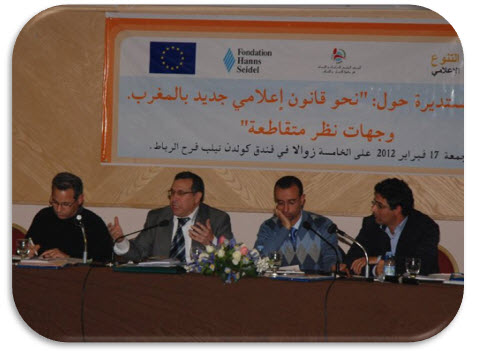Published: 12 October 2012
Country: Morocco
 The Media Diversity Institute (MDI) with the participation of the Moroccan Center for Research and Studies on Human Rights and Media organised a roundtable debate in Rabat on “Ethical Codes of Conduct and Problematic Diversity Issues”. Many questions were raised amongst which are the usage of French language in public radio and TV stations in Morocco.
The Media Diversity Institute (MDI) with the participation of the Moroccan Center for Research and Studies on Human Rights and Media organised a roundtable debate in Rabat on “Ethical Codes of Conduct and Problematic Diversity Issues”. Many questions were raised amongst which are the usage of French language in public radio and TV stations in Morocco.

Islamic researcher, Bilal Al-Talidi, said that ethical codes of conduct, at least in their initial formulation, disseminate concepts such as pluralism and diversity associated to languages, cultures and disciplines, in contrast with the past, when they were limited to parties and syndicates. And keeping in mind the new constitutional requirements, when referring to the public service, the public audio – visual media are obliged to guarantee, along with the required quality, professionalism and respect for diversity.
Al Talidi reiterated that ethical codes of conduct set the mechanisms for measuring the commitment for the public audio and visual media to ensuring diversity in all its dimensions through newscasts and talk shows.
Although at the beginning he pointed at the advantages of setting up ethical codes of conducts, including to turn the Amazigh channel into a public channel, extending its broadcast schedule to 24 hours, Ahmad Assid, the Amazigh activist, criticized the priority given to the conservative parties point of view. He also criticised, as he said, the attempts to eradicate French language from the public media, overlooking the fact that it’s actually a diversity component.
The French language, according to Assid, isn’t a foreign language if we take into account the amount of Moroccan books and productions written in French. Assid argued that anyone who is willing to eradicate French language must also be brave enough to eradicate it from education as well.
 The attendees reacted regarding to the French language issues. Some said that it’s not more than a language of openness like others languages and so is the Amazigh, the way of formalizing it and the independence that should characterize public media, placed at a distance from main power centers.
The attendees reacted regarding to the French language issues. Some said that it’s not more than a language of openness like others languages and so is the Amazigh, the way of formalizing it and the independence that should characterize public media, placed at a distance from main power centers.
The Amazigh activist also pointed out that the ethical codes of conduct did not tackle in particular the space time for the Amazigh and Ḥassaniyah as well. In fact, he says, they are overlooked in both thematic channels.
And after slamming the political regulation of public media and the linked “corruption”, Abdel Aziz Nouaydi highlighted that diversity always strive for peace and security. He made reference to the Rwanda case and the negative media role in it, in particular the incitement exercised by radio and TV stations, either in behalf of the Hutu or the Tutsi.
Nouaydi added that ethical codes of conduct wouldn’t be adequately applied without an independent High Authority for Audiovisual Communication (HACA). He called on the necessity together with the ethical codes of conduct of important reforms, including HACA, audio and visual media and the methodology of appointing persons in charge in public media institutions.
The roundtable was organised within the framework of the Media Diversity Institute’s 2 year project ‘Media Evolution: Towards an Inclusive, Responsible & Independent Media in Morocco’, supported by the European Union Delegation, and UK & Swiss Embassies in Rabat.
The objectives of the project are to encourage a public debate on the future of the Moroccan media, ensure greater coverage of social diversity in the media, improve freedom of expression and access to information, ensure greater responsibility by the media through self-regulation, and improve respect of media freedom by the government.